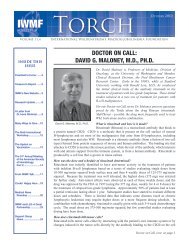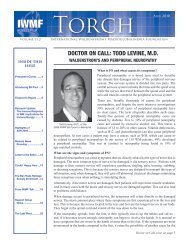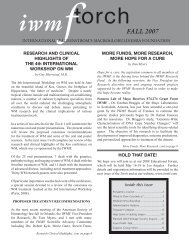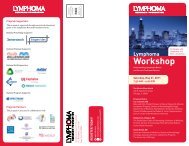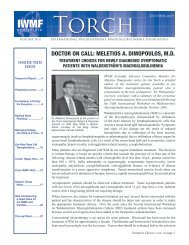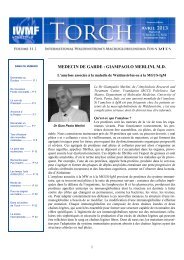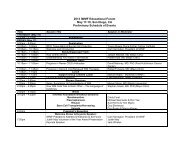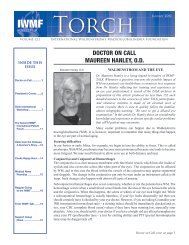SURVIVORSHIP IN CANCER - International Waldenstrom's ...
SURVIVORSHIP IN CANCER - International Waldenstrom's ...
SURVIVORSHIP IN CANCER - International Waldenstrom's ...
Create successful ePaper yourself
Turn your PDF publications into a flip-book with our unique Google optimized e-Paper software.
From IWMF-Talk, cont. from page 19<br />
feet that so many of us experience, what other types of nerve<br />
damage might be caused elsewhere in the body?<br />
[Dr. Hochberg spoke at the June IWMF Educational Forum in<br />
Minneapolis. His presentation is included in the Forum DVDs<br />
and a summary is found in the Ed Forum Review: 2011]<br />
Sharon Poteshman wondered if anyone had success treating<br />
PN caused by WM but not attributable to Velcade or any other<br />
treatment. Sharon had one round of four Rituxan treatments<br />
that brought her IgM down and hemoglobin up but did not<br />
relieve the PN. Dr. Jacob Weintraub suggested that Sharon’s<br />
IgM is still too high to relieve her PN, if indeed the neuropathy<br />
is truly related to her WM. “Some of us,” Jacob offered, “have<br />
PN that started when our IgM was below 1000. Sharon’s IgM<br />
may need to be much lower than it is now.” Jacob added that<br />
nerve regeneration is a slow process. When IgM is lowered<br />
significantly, it may take months before improvement is<br />
noticed. Finally, Jacob recalls Dr. Treon’s comment that if a<br />
person has had PN for a period of time greater than two years<br />
it may no longer be completely reversible.<br />
Platelets<br />
Sara “eyeonthesky” writes that her 84-year-old father’s<br />
platelet counts are slowly decreasing – now at 114 (thousand).<br />
Sara asks at what point would he need treatment to bring<br />
platelets up? He has no bleeding problems yet.<br />
“Linda54jane” responded that she has ITP (idiopathic<br />
thrombocytopenic purpura) with low platelet counts.<br />
Her hematologist is not concerned as long as platelets remain<br />
above 20 (thousand). “I would need treatment for any surgical<br />
procedures, but risk of spontaneous bleeding is low. When<br />
they drop below 20, the hematologist will prescribe IVIg to<br />
bring them to a safer level,” writes Linda Jane. The infusion<br />
is costly, but it has brought her platelets back to normal, with<br />
a gradual decrease over months. “I would not want or seek<br />
treatment at 114 (thousand),” was her final comment.<br />
Eye Migraine<br />
Scott Keddal had a visual problem for about 25 minutes on the<br />
day he wrote. He experienced wavy, pain-free distortion and<br />
flashes in one eye, and although Scott could still see things,<br />
everything in that one eye appeared as if he were looking<br />
through a wavy liquid. A friend of Scott’s who works for an<br />
optometrist said that these are called eye migraines, that they<br />
are somewhat common, and that if they are not accompanied<br />
by pain or other effects then not to worry. Scott wondered if<br />
WM was influencing or causing this visual problem.<br />
Marla Kressall asked Scott: “Do you know your viscosity<br />
level?” This exact thing happened to Marla’s husband.<br />
Somehow his viscosity had not been measured and it turned<br />
out to be high: 4.0. Marla had to take over the driving one day<br />
from her husband because he was seeing “something wavy.”<br />
Marla knew immediately he needed plasmapheresis (PP). His<br />
doctor sent him to a retinal specialist, who confirmed Marla’s<br />
“diagnosis.” After the PP her husband’s vision improved only<br />
slightly, possibly because it took three days to get the PP done.<br />
Art Mulholland then added that he has had eye migraines<br />
since 1999. In Art’s case, what he calls the “neon distortions”<br />
move from left to right, last approximately 15 minutes, and<br />
are preceded by slightly blurred vision. The ophthalmologic<br />
neurologist he consulted believed that Art’s migraines could<br />
have been caused by the Waldenstrom’s. Apparently they are<br />
common and are not serious unless they last longer and are<br />
accompanied by pain.<br />
Bernice Goll joined the discussion, saying that as an<br />
optometrist it is her understanding that ophthalmic migraines<br />
are triggered in the same way as migraine headaches: there<br />
is a reversible constriction of blood vessels in response to<br />
some chemical trigger. These chemical triggers can be<br />
external – such as caffeine, red wine, or aged cheese – or<br />
internal – hormones, for example. These migraines are<br />
generally felt to be benign. Most people will have the<br />
experience at least once in their lives, though some are more<br />
prone to having them. Bernice recommends getting a dilated<br />
eye exam, especially if symptoms occur in only one eye.<br />
WM can lead to eye-circulation problems, which should be<br />
checked out. Bernice offered that eye doctors generally do not<br />
associate the phenomenon with a serious condition. But she<br />
is always a bit suspicious upon hearing that it has happened to<br />
someone with no history of headaches, especially if it comes<br />
on suddenly and with frequency.<br />
Nosebleeds<br />
Kierin DeArmand wrote regarding her husband who was<br />
diagnosed in 2004. So far he has been asymptomatic and<br />
has had no treatment. However, in the last 6 months he<br />
has had nosebleeds that can last for hours, and in the last<br />
2 months they have been much more frequent. And he has<br />
From IWMF-Talk, cont. on page 21<br />
HOW TO JO<strong>IN</strong> IWMF-TALK<br />
Here are two ways to join:<br />
1. Send a blank e-mail to: iwmf-talk-subscribe-request@lists.psu.edu<br />
Make sure to enter the word “subscribe” as your subject, and do not sign or put anything in the message area (make<br />
sure you do not have any signature information in there). Also, do not put a “period” after “edu” or it will reject. Once<br />
approved you can post by sending e-mail to iwmf-talk@lists.psu.edu<br />
2. Contact Peter DeNardis at pdenardis@comcast.net and provide your full name<br />
20 IWMF TORCH Volume 12.4



